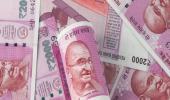The rupee has depreciated by 0.6 per cent so far in the current financial year.

The Indian rupee was the second-worst-performing Asian currency in August after the Bangladeshi taka due to strong dollar demand and outflows from domestic equities.
It depreciated by 0.2 per cent during the month.
The two were the only Asian currencies that experienced a decline against the US dollar over the month. The rupee settled at Rs 83.86 per dollar on Friday, August 30, 2024.
"The rupee depreciated by 0.2 per cent in August to currently trade at 83.87 per dollar, close to its lifetime low of 83.97 per dollar. This was despite the weakening of the US dollar," said Sonal Badhan, economist at Bank of Baroda.
"The factors that impacted the rupee are a slowdown in FPI inflows (mainly the equity segment), and increased dollar demand by importers. In contrast to most global currencies which rose against the dollar, the rupee declined," Badhan added.
In the current financial year, the rupee has depreciated by 0.6 per cent, so far.
The rupee was the third most stable Asian currency against the US dollar in the last financial year (FY24) after the Hong Kong dollar and Singapore dollar, primarily due to timely intervention by the Reserve Bank of India.
The rupee depreciated by 1.5 per cent over the year against 7.8 per cent in FY23.
Additionally, in the calendar year 2023, the local currency displayed remarkable stability against the dollar, marking the least volatility it witnessed in nearly three decades.
The India unit experienced a marginal depreciation of 0.5 per cent against the greenback.
The last time the Indian unit exhibited such stability was in 1994, when it appreciated by 0.4 per cent.
As the rupee touched a record low in August 2024 despite a weak US dollar, market participants expect the local currency to remain range-bound in the near term.
The weakness in crude oil prices and recent changes to the MSCI index, which added seven Indian stocks and increased the adjustment factor for HDFC Bank, can potentially boost FPI inflows into equities, further aiding the rupee.
"We continue with the stance that for now the RBI would not allow the rupee to cross 84 and would await for Fed signals on the interest rate to move forward," said Anil Kumar Bhansali, head of treasury and executive director at Finrex Treasury Advisors LLP.

Feature Presentation: Ashish Narsale/Rediff.com












 © 2025
© 2025